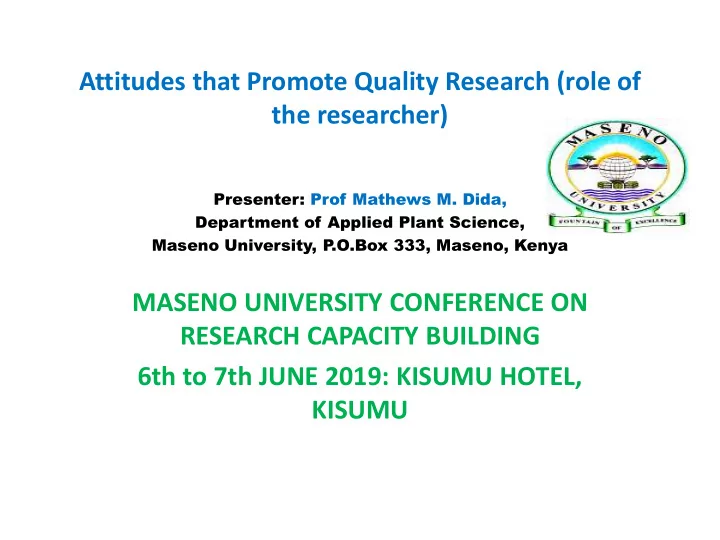

Attitudes that Promote Quality Research (role of the researcher) Presenter: Prof Mathews M. Dida, Department of Applied Plant Science, Maseno University, P .O.Box 333, Maseno, Kenya MASENO UNIVERSITY CONFERENCE ON RESEARCH CAPACITY BUILDING 6th to 7th JUNE 2019: KISUMU HOTEL, KISUMU
Presentation outline • Sociological definition of Attitude • Attitude and Behaviour • Behavioural Science principles for service encounter management (Customer/client management) • Positivity and research • Games theory and societal applications
Attitude • Attitude is relatively stable overt behavior of person which affects his status (Bain, 1927- 28). • Attitude is a status fixing behavior, that differentiate it from habit and vegetative processes.
Attitudes and Behavior • An attitude is "a relatively enduring feelings, and behavioral tendencies towards socially significant objects, groups, events or symbols“ (McLeod S, 2018). • Attitudes structure can be described in terms of three components./the ABC model of attitudes
Structure of Attitudes • Affective component : this involves a person’s feelings / emotions about the attitude object. For example: “I am scared of spiders”. • Behavioral (or conative) component: the way the attitude we have influences how we act or behave. For example: “I will avoid spiders and scream if I see one”. • Cognitive component: this involves a person’s belief / knowledge about an attitude object. For example: “I believe spiders are dangerous”. (Source: McLeod S, 2018)
• Knowing a person’s attitude helps us predict their behavior. For example, knowing that a person is religious we can predict they will go to Church.
Behavioural Science principles for service encounter management (Customer/client management ) • The Five Operating Principles ( Chase and Dasu, 2001) Harvard Business Review 1. Finish Strong : the beginning and end of an encounter- stating that the end of an encounter is strongest in customer recollections. 2. Get the Bad Experiences Out of the Way Early : Research reveals that people prefer to have undesirable events come first in order before the desirable ones. That service providers, should prefer delivering bad news, getting the pain and discomfort out of the way first, “so they don’t dominate the customer’s recollection of the entire experience” . 3.Segment the Pleasure, Combine the Pain : This principle is translated from duration effects: an experience will seem longer if broken up into sections. The authors say breaking up the pleasurable aspects of an encounter will likely make the overall encounter seem better to the customer when the negative aspects are combined.
5 Cs Cont . 4. Build Commitment Through Choice : When experiencing any sort of process, people are more comfortable when they feel some control. Giving customers more choices creates a better service encounter. 5. Give People Rituals, and Stick to Them : People find “comfort, order, and meaning in repetitive, familiar activities”.
Positivity (positive attitude) and research • “Positive thinking means approaching life’s challenges with a positive outlook. • It does not necessarily mean avoiding or ignoring the bad things; instead, it involves making the most of the potentially bad situations, • trying to see the best in other people, and viewing yourself and your abilities in a positive light.”
Traits and Characteristics associated with positive mindset • Optimism: a willingness to make an effort and take a chance instead of assuming your efforts won’t pay off. • Acceptance: acknowledging that things don’t always turn out how you want them to, but learning from your mistakes. • Resilience: bouncing back from adversity, disappointment, and failure instead of giving up. • Gratitude: actively, continuously appreciating the good things in your life. • Consciousness/Mindfulness: dedicating the mind to conscious awareness and enhancing the ability to focus. • Integrity: the trait of being honorable, righteous, and straightforward, instead of deceitful and self-serving.
Games theory/ Prisoner’s dilemma
The ‘Nash Equilibrium’ • Mathematician John Nash showed the following: • in non-cooperative games there exists an equilibrium at which no side has any rational incentive to change the chosen strategy even after running through all the choices available to the opponent(s). • John Nash showed that important economic, political or social interactions can be hinged on desirable outcomes without the need for any contracts.
Cultural factors
Thank you
Recommend
More recommend